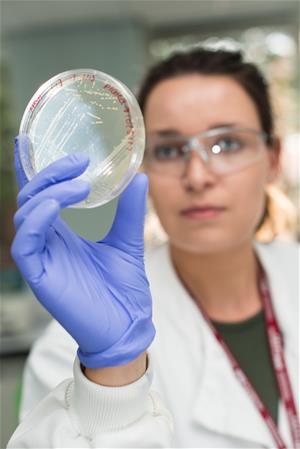University of Hull is investing nearly half a million pounds in eight PhD scholarships to enhance healthcare
 Designed to attract the best talent and deliver great research that has impact, these scholarships are open to high-calibre students who will work on specific projects, all with critical importance – including radiotherapy, a key cancer strategy, and the treatment of co-existing health conditions such as dementia.
Designed to attract the best talent and deliver great research that has impact, these scholarships are open to high-calibre students who will work on specific projects, all with critical importance – including radiotherapy, a key cancer strategy, and the treatment of co-existing health conditions such as dementia.
The investment in health research is part of the University’s wider £1.9-million investment in 32 PhD scholarships to tackle a range of issues from plastics pollution to human trafficking.
Designed to attract the best talent and deliver great research that has impact, these scholarships are open to high-calibre students who will work on specific projects, all with critical importance – including radiotherapy, a key cancer strategy, and the treatment of co-existing health conditions such as dementia.
Successful candidates will have their tuition fees funded throughout the PhD programmes as well as stipendiary living costs, totalling around £20,000 per year.
Professor Julie Jomeen, Dean of the Faculty of Health Sciences, said:
“The University is intent on attracting ambitious students to the University to work with us on specific health projects that can make a difference to future generations.
“Our commitment to improving the health of the region and beyond underpins this investment in PhD scholarships which will tackle the issues of those people living with multiple conditions including dementia. Research will advance healthcare and support for patients and their families enabling them not just to cope with their conditions, but to live well with them.”
In addition to those exploring multiple health conditions, other PhD research into radiotherapy – an underrepresented area of research focus in the UK and worldwide – will focus on advancing radiation therapy and molecular imaging of cancer tumours.
Developing scientific insights and innovative treatments to benefit patients is ongoing at the University of Hull.
Our Institute for Clinical and Applied Health Research (ICAHR) brings together expertise from Hull York Medical School and the School of Health and Social Work to build on our existing success in globally-significant applied healthcare research. A range of specialist units to help us become a centre of excellence in everything from research methodology to actual impact and outcomes and achieve our vision to be a world leader in well-designed applied health research.
The University’s health research is already a major strength, helping to address critical health issues in our region and beyond, with 87% of the University’s ‘world-leading’ or ‘internationally excellent'.
"The University is intent on attracting ambitious students to the University to work with us on specific health projects that can make a difference to future generations".
Professor Julie Jomeen, Dean of the Faculty of Health Sciences
Our PhD students are already working with global medical technology giant Smith & Nephew, which combines the brightest minds with the finest R&D facilities to drive research into pioneering approaches to advanced wound care.
Many of our PhD students working in health benefit from access to the vibrant research community at the heart of our £28-million Allam Medical Building and health campus, which was opened by Her Majesty the Queen in November.
The Wolfson Palliative Care Research Centre has brought together a group of high-profile world-class researchers here to support those people with progressive, life-limiting illness – to help them to live well through the control of their symptoms, support for psychological, social and spiritual concerns, and care for their families and friends.
The University of Hull is also helping to ensure pregnant women and new parents get the best care possible when it comes to their mental health. Dean of the Faculty of Health Sciences and Professor of Midwifery, Julie Jomeen, has led researchers and specialist nurses from the region’s NHS trust to provide a better service for women and their families.
Building on the University’s strong track record of research into how cancer is understood, diagnosed and treated, Yorkshire Cancer research awarded the University of Hull and Hull York Medical School a grant of over £5 million to tackle cancer inequalities in the region.
Our world-class health research was showcased at this year’s British Science Festival, hosted at the University of Hull, celebrating new perspectives and innovation in the world of science.
Jordon Sandland, Bioorganic Chemistry PhD student at the University of Hull, said:
“I chose to study my PhD at Hull because of the chemistry facilities at the University and the PET (Positron Emission Tomography) research centre – which uses medical imaging technology for research and early diagnosis and is the only of its kind in the UK.
“Although the University is already well known for its research into LCD technology (which is responsible for the liquid crystal displays on our mobile phones), the University is also pushing the frontiers of cancer therapy and imaging to help improve diagnosis and treatment for patients.”
Find out more
You can find out more about applying for our postgraduate courses and details of our scholarships, including closing dates at the following web page https://www.hull.ac.uk/study/pgr/phd/phd-scholarships.aspx .





















